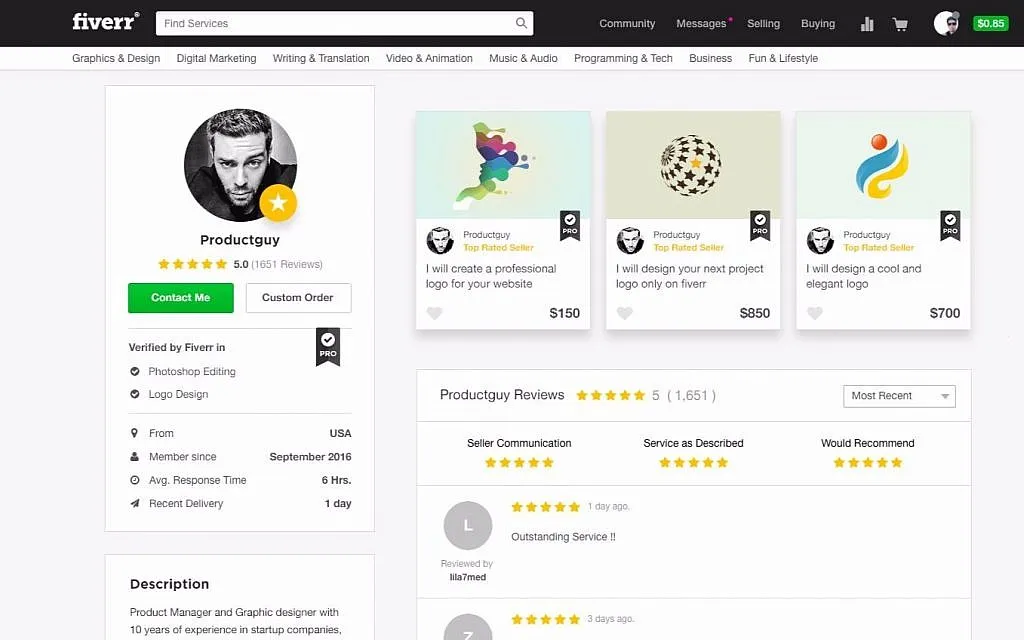In today’s digital age, platforms like Fiverr have revolutionized the way we work and hire services. But with this shift comes a critical question: Is Fiverr legal? This blog post will delve into the legality of using Fiverr and explore what you need to know before diving into the freelance economy. Whether you’re a freelancer looking to showcase your skills or someone seeking services for a project, it’s important to understand the legal framework surrounding Fiverr’s operations.
The Basics of Fiverr

Fiverr is an online marketplace that connects freelancers with clients seeking various services, often referred to as “gigs.” Founded in 2010, Fiverr allows people to offer services in many categories, ranging from graphic design to writing, and even virtual assistance. Here’s a closer look at how Fiverr works:
- User Registration: To start using Fiverr, both freelancers and clients must create accounts. This process is simple and typically requires only an email address and password.
- Service Listings: Freelancers can create detailed service listings that outline what they offer, the pricing structure, and delivery timelines. Clients can browse through these listings based on their specific needs.
- Payment System: Fiverr operates on a unique payment model. Clients pay upfront for services, and the money is held in escrow until the service is completed. Fiverr takes a commission from the transaction, ensuring freelancers get paid.
- Reviews and Ratings: After a gig is completed, clients can leave reviews, which help maintain quality and transparency on the platform.
Fiverr has grown immensely since its inception, hosting millions of gigs and freelancers from all around the world. This accessibility has opened doors for many—both for those seeking to work and those looking to get projects done without the traditional hiring processes. But as with any platform, there are crucial legal implications to keep in mind as we navigate this freelance ecosystem.
Also Read This: How to Set Up PayPal on Fiverr
Understanding Freelance Platforms

Freelance platforms like Fiverr have transformed the way people work and hire services. But what exactly are these platforms? In simple terms, they are online marketplaces where freelancers offer their skills, and clients can hire them for specific projects. Fiverr, which originated in 2010, is one of the most popular platforms and allows freelancers to list services known as "gigs" in various categories, from graphic design to writing and programming.
One of the appealing aspects of Fiverr is its user-friendly interface. Clients can easily browse through services, read reviews, and compare prices. Freelancers can create profiles showcasing their skills, portfolio, and past work, which helps build credibility and attract clients. Here are some key features that make Fiverr stand out:
- Variety of Services: From digital marketing to video editing, there's almost no limit to the gigs you can find.
- Budget-Friendly: Services start at just $5, making it accessible for individuals and small businesses.
- Global Reach: You can hire or work with people from all over the world, broadening opportunities.
- Secure Payments: Fiverr uses an escrow system to ensure that transactions are secure for both parties.
However, it's important to recognize that while Fiverr offers many benefits, it also has its challenges. Competition is stiff, and freelancers often have to continually refine their offerings to stand out. So, whether you're a freelancer looking to showcase your talents or a client in need of services, understanding how these platforms work is crucial for a successful experience.
Also Read This: How to Block a Buyer on Fiverr
Legal Aspects of Using Fiverr

When diving into the world of freelance services, one significant concern arises: legality. You might be wondering, “Is it really legal to use Fiverr?” The good news is that using Fiverr is generally legal, but there are important legal aspects to consider.
First off, all users must adhere to Fiverr's Terms of Service. This includes respecting copyright laws, avoiding fraudulent activities, and accurately representing services offered. If a user violates these terms, Fiverr holds the right to suspend or terminate their account. Here are some key legal aspects to keep in mind:
- Intellectual Property Rights: Freelancers typically retain the rights to their work until the client pays for it. Once payment is made, rights transfer as per the agreement.
- Contractual Nature: When a client orders a gig, they are essentially entering into a contract with the freelancer. Clear communication and understanding of deliverables can prevent future disputes.
- Tax Obligations: Freelancers are responsible for reporting their income to tax authorities, depending on their country's tax laws. Clients also need to consider their tax implications when hiring freelancers.
- Compliance with Local Laws: Users must comply with local laws regarding the services they are offering or purchasing, which can vary by country.
Overall, while Fiverr offers a convenient platform for freelance work, both freelancers and clients must navigate its legal landscape carefully. By being informed and proactive, you can enjoy everything Fiverr has to offer while staying within legal guidelines.
Also Read This: How Do I Place an Order on Fiverr?
Common Concerns Regarding Fiverr's Legality

When discussing the legality of Fiverr and similar freelance platforms, several common concerns tend to pop up. Let's unpack a few of these issues to help alleviate any worries you might have.
- Employment Status: One of the major concerns revolves around whether freelancers are classified as employees or independent contractors. Freelancers on Fiverr are generally considered independent contractors, which means they have more flexibility but also take on the risks of self-employment.
- Intellectual Property Rights: Another big topic is the ownership of work created on Fiverr. It’s crucial to understand that freelancers retain the copyright of their work unless they explicitly transfer it to the client. This means that clients need to ensure that their deal includes the transfer of any necessary rights.
- Tax Compliance: Many worry about the tax implications of earning money through Fiverr. Since freelancers are self-employed, they must report their earnings and possibly pay self-employment tax. Not reporting these earnings could lead to legal issues down the line.
- Scams and Fraud: The internet can be a murky place, and unfortunately, scams do exist. Fiverr has safety measures in place, but it’s important to conduct due diligence before hiring a freelancer or accepting a gig.
Overall, while there are concerns regarding the legality of Fiverr, it operates within legal boundaries when used correctly. Just like any platform, proper research and understanding of its terms and conditions can go a long way.
Also Read This: How to Post Services on Fiverr
Tax Implications for Freelancers and Clients
Understanding the tax implications for both freelancers and clients using Fiverr is crucial. It may sound like a tedious topic, but it’s important not to overlook. Let’s break it down.
For Freelancers
As a freelancer on Fiverr, your earnings are considered self-employment income. Here are some key points to consider:
- Reporting Income: You’re responsible for reporting all income you earn through the platform, even if you don’t receive a 1099 form.
- Self-Employment Tax: Freelancers need to pay self-employment tax, which includes Social Security and Medicare taxes, typically around 15.3% of your net earnings.
- Deductions: You can deduct allowable business expenses from your income, which can significantly lower your taxable income. Common deductions include:
- Software subscriptions
- Marketing costs
- Home office expenses
For Clients
Clients also need to be aware of their responsibilities:
- Tax Reporting: In many cases, clients are not responsible for withholding taxes from payments made to freelancers. However, if they pay $600 or more in a year, they may have to issue a 1099 form.
- International Payments: If hiring freelancers from abroad, clients should be aware of tax treaties and regulations that may apply.
To sum it up, both freelancers and clients should keep good records and consult with a tax professional to navigate this complex area effectively. Understanding your obligations can help you avoid any nasty surprises come tax season!
Also Read This: How to Create a Gig on Fiverr: A Step-by-Step Guide
7. Best Practices for Ensuring Legal Compliance
When engaging in freelance services on platforms like Fiverr, it's essential to stay on the right side of the law. Here are some best practices to ensure legal compliance while making the most of your freelance journey:
- Understand Your Local Laws: Each country and state can have different regulations regarding freelance work. It's crucial to familiarize yourself with tax requirements, business licenses, and permitted services in your area.
- Register Your Business: If you earn a significant income or plan to freelance long-term, consider registering your business. This adds legitimacy and helps handle taxes professionally.
- Keep Accurate Records: Maintain an organized bookkeeping system to track your earnings and expenses. Good records help during tax season and if an audit occurs.
- Use Clear Contracts: Always draft agreements that outline the scope of work, deadlines, deliverables, and payment terms. Contracts protect you and your clients by setting clear expectations.
- Respect Intellectual Property Rights: Be mindful about using others’ work, artwork, or music. Obtain necessary licenses to ensure you’re not infringing on anyone's copyrights.
- Disclose Important Information: If you're working with clients from other countries, disclose any potential taxes, fees, or legal considerations tied to their locality.
- Keep Client Information Confidential: Respect the privacy of your clients by not sharing sensitive information without their consent. This builds trust and keeps you compliant with privacy laws.
By following these best practices, you can ensure that you not only have a successful freelance career on Fiverr but also one that is compliant and free from legal troubles.
8. Conclusion
So, is Fiverr legal? The short answer is yes, but that doesn’t mean it’s a free-for-all! The platform operates within legal frameworks and provides several safeguards to protect both freelancers and clients. However, navigating the world of freelance services requires diligence on your part. It’s vital to understand your obligations, especially concerning taxes, contracts, and intellectual property.
As a freelancer, you have the responsibility to establish your professional boundaries and ensure that you comply with laws that apply to your specific situation. By adhering to best practices, you can reduce risks and focus on providing exceptional services. Remember, legality is not just about avoiding legal infractions; it’s also about building a reputable, trustworthy freelance business that stands the test of time.
Ultimately, whether you’re a buyer or seller on Fiverr, staying informed is key. So take the time to educate yourself, develop good habits, and thrive in the exciting world of freelancing!



